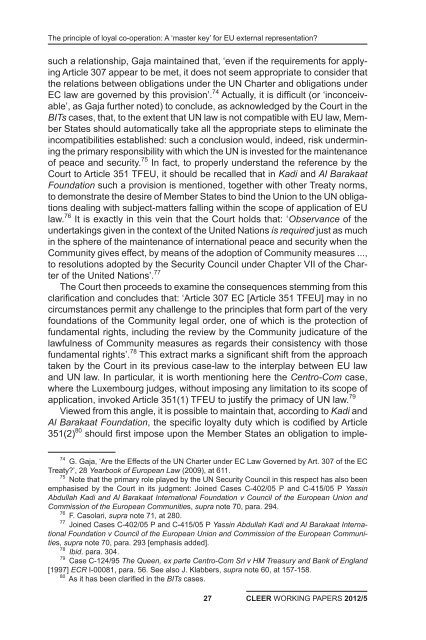Principles and practices of EU external representation - TMC Asser ...
Principles and practices of EU external representation - TMC Asser ...
Principles and practices of EU external representation - TMC Asser ...
You also want an ePaper? Increase the reach of your titles
YUMPU automatically turns print PDFs into web optimized ePapers that Google loves.
The principle <strong>of</strong> loyal co-operation: A ‘master key’ for <strong>EU</strong> <strong>external</strong> <strong>representation</strong>?<br />
such a relationship, Gaja maintained that, ‘even if the requirements for applying<br />
Article 307 appear to be met, it does not seem appropriate to consider that<br />
the relations between obligations under the UN Charter <strong>and</strong> obligations under<br />
EC law are governed by this provision’. 74 Actually, it is difficult (or ‘inconceivable’,<br />
as Gaja further noted) to conclude, as acknowledged by the Court in the<br />
BITs cases, that, to the extent that UN law is not compatible with <strong>EU</strong> law, Member<br />
States should automatically take all the appropriate steps to eliminate the<br />
incompatibilities established: such a conclusion would, indeed, risk undermining<br />
the primary responsibility with which the UN is invested for the maintenance<br />
<strong>of</strong> peace <strong>and</strong> security. 75 In fact, to properly underst<strong>and</strong> the reference by the<br />
Court to Article 351 TF<strong>EU</strong>, it should be recalled that in Kadi <strong>and</strong> Al Barakaat<br />
Foundation such a provision is mentioned, together with other Treaty norms,<br />
to demonstrate the desire <strong>of</strong> Member States to bind the Union to the UN obligations<br />
dealing with subject-matters falling within the scope <strong>of</strong> application <strong>of</strong> <strong>EU</strong><br />
law. 76 It is exactly in this vein that the Court holds that: ‘Observance <strong>of</strong> the<br />
undertakings given in the context <strong>of</strong> the United Nations is required just as much<br />
in the sphere <strong>of</strong> the maintenance <strong>of</strong> international peace <strong>and</strong> security when the<br />
Community gives effect, by means <strong>of</strong> the adoption <strong>of</strong> Community measures ...,<br />
to resolutions adopted by the Security Council under Chapter VII <strong>of</strong> the Charter<br />
<strong>of</strong> the United Nations’. 77<br />
The Court then proceeds to examine the consequences stemming from this<br />
clarification <strong>and</strong> concludes that: ‘Article 307 EC [Article 351 TF<strong>EU</strong>] may in no<br />
circumstances permit any challenge to the principles that form part <strong>of</strong> the very<br />
foundations <strong>of</strong> the Community legal order, one <strong>of</strong> which is the protection <strong>of</strong><br />
fundamental rights, including the review by the Community judicature <strong>of</strong> the<br />
lawfulness <strong>of</strong> Community measures as regards their consistency with those<br />
fundamental rights’. 78 This extract marks a significant shift from the approach<br />
taken by the Court in its previous case-law to the interplay between <strong>EU</strong> law<br />
<strong>and</strong> UN law. In particular, it is worth mentioning here the Centro-Com case,<br />
where the Luxembourg judges, without imposing any limitation to its scope <strong>of</strong><br />
application, invoked Article 351(1) TF<strong>EU</strong> to justify the primacy <strong>of</strong> UN law. 79<br />
Viewed from this angle, it is possible to maintain that, according to Kadi <strong>and</strong><br />
Al Barakaat Foundation, the specific loyalty duty which is codified by Article<br />
351(2) 80 should first impose upon the Member States an obligation to imple-<br />
74 G. Gaja, ‘Are the Effects <strong>of</strong> the UN Charter under EC Law Governed by Art. 307 <strong>of</strong> the EC<br />
Treaty?’, 28 Yearbook <strong>of</strong> European Law (2009), at 611.<br />
75 Note that the primary role played by the UN Security Council in this respect has also been<br />
emphasised by the Court in its judgment: Joined Cases C-402/05 P <strong>and</strong> C-415/05 P Yassin<br />
Abdullah Kadi <strong>and</strong> Al Barakaat International Foundation v Council <strong>of</strong> the European Union <strong>and</strong><br />
Commission <strong>of</strong> the European Communities, supra note 70, para. 294.<br />
76 F. Casolari, supra note 71, at 280.<br />
77 Joined Cases C-402/05 P <strong>and</strong> C-415/05 P Yassin Abdullah Kadi <strong>and</strong> Al Barakaat International<br />
Foundation v Council <strong>of</strong> the European Union <strong>and</strong> Commission <strong>of</strong> the European Communities,<br />
supra note 70, para. 293 [emphasis added].<br />
78 Ibid. para. 304.<br />
79 Case C-124/95 The Queen, ex parte Centro-Com Srl v HM Treasury <strong>and</strong> Bank <strong>of</strong> Engl<strong>and</strong><br />
[1997] ECR I-00081, para. 56. See also J. Klabbers, supra note 60, at 157-158.<br />
80 As it has been clarified in the BITs cases.<br />
27<br />
CLEER WORKING PAPERS 2012/5

















